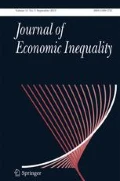Abstract
This paper improves the empirical investigation on the effectiveness of the median voter theorem. Using high quality data, it is possible to directly observe individual net cash transfers in several countries and to investigate the effects of taxes and transfers on different social classes and in aggregate. This allows testing of both the “redistribution hypothesis” (more inequality leads to more redistribution in aggregate) and the “median voter hypothesis” (the middle class plays a special role in policy making). Results suggest acceptance of the former and reject on, or at least questioning, of the latter. Not only the gains from redistribution are negligible for the middle class, but also the link between income and redistribution is also lower for it than for any other class of income. Moreover, the strength of the median voter seems to fall over time. Finally, the amount of redistribution targeted to the middle class is lower in more asymmetric societies, a result that contrasts strongly with the median voter theorem.
Similar content being viewed by others
References
Acemoglu, D., Robinson, J.A.: Why did the west extend the franchise? Democracy, inequality, and growth in historical perspective. Q. J. Econ. 115, 1167–1199 (2000)
Acemoglu, D., Robinson, J.A.: De facto political power and institutional persistence. Am. Econ. Rev. 96, 325–330 (2006)
Alesina, A., Rodrik, D.: Distributive politics and economic growth. Q. J. Econ. 109, 465–490 (1994)
Beck, T., Clarke, G., Groff, A., Keefer, P., Walsh, P.: New tools in comparative political economy: the database of political institutions. World Bank Econ. Rev. 15, 165–176 (2001)
Bénabou, R.: Unequal societies: income distribution and the social contract. Am. Econ. Rev. 90, 96–129 (2000)
Bertola, G.: Factor shares and savings in endogenous growth. Am. Econ. Rev. 83, 1184–1198 (1993)
Bourguignon, F., Verdier, T.: Oligarchy, democracy, inequality and growth. J. Dev. Econ. 62, 285–313 (2000)
Deininger, K., Squire, L.: New ways of looking at old issues: inequality and growth. J. Dev. Econ. 57, 259–287 (1998)
Downs, A.: An Economic Theory of Democracy. Harper Row, London (1957)
Epple, D., Romano, R.E.: Ends against the middle: determining public service provision when there are private alternatives. J. Public Econ. 62, 297–325 (1996)
Fields, G.: A Compendium of Data on Inequality and Opverty for the Developing World. Cornell University (1989, unpublished manuscript)
Galor, O., Zeira, J.: Income distribution and macroeconomics. Rev. Econ. Stud. 60, 35–52 (1993)
Heston, A., Summers, R., Aten, B.: Penn World Table Version 6.3. Technical Report, Center for International Comparisons of Production, Income and Prices at the University of Pennsylvania (2009)
Hotelling, H.: Stability in competition. Econ. J. 39, 41–57 (1929)
Jain, S.: Size Distribution of Income: A Compilation of Data. World Bank, Washington (1975)
LIS: Luxembourg Income Study Database. http://www.lisproject.org/techdoc.htm. Multiple countries 1967–2005 (2009)
Marshall, M.G., Jaggers, K.: Polity IV project: Data Users’ Manual. Technical Report, Polity IV project (2009)
Meltzer, A.H., Richard, S.F.: A rational theory of the size of government. J. Polit. Econ. 89, 914–927 (1981)
Milanovic, B.: The median-voter hypothesis, income inequality, and income redistribution: an empirical test with the required data. Europ. J. Polit. Economy 16, 367–410 (2000)
Milanovic, B.: Four critiques of the redistribution hypothesis: an assessment. Europ. J. Polit. Economy 26, 147–154 (2010)
Paukert, F.: Income distribution at different levels of development: a survey of evidence. Int. Labour Rev. 108, 97–125 (1973)
Perotti, R.: Political equilibrium, income distribution, and growth. Rev. Econ. Stud. 60, 755–776 (1993)
Perotti, R.: Growth, income distribution, and democracy: what the data say. J. Econ. Growth 1, 149–187 (1996)
Persson, T., Tabellini, G.: Is inequality harmful for growth? Am. Econ. Rev. 84, 600–621 (1994)
Saint-Paul, G., Verdier, T.: Education, democracy and growth. J. Dev. Econ 42, 399–407 (1993)
Scervini, F.: Political Economy of Director’s Law: How Sincere Voters Decide on Cash and In-kind Redistribution in a Costly Political Framework. Technical Report, University of Torino, Department of Economics and Public Finance “G. Prato” (2009)
Taylor, C., Hudson, M.: World Handbook of Political and Social Indicators. Yale University Press, New Haven (1972)
Author information
Authors and Affiliations
Corresponding author
Rights and permissions
About this article
Cite this article
Scervini, F. Empirics of the median voter: democracy, redistribution and the role of the middle class. J Econ Inequal 10, 529–550 (2012). https://doi.org/10.1007/s10888-011-9183-2
Received:
Accepted:
Published:
Issue Date:
DOI: https://doi.org/10.1007/s10888-011-9183-2



